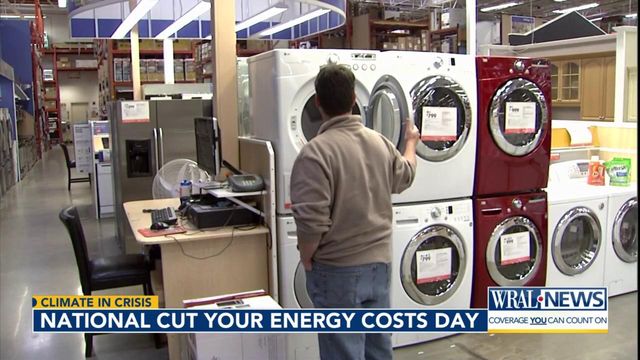Easy ways to cut costs on your energy bills
On average, households in North Carolina spend about $2,100 each year on energy bills, and electricity use accounts for one-third of the state's greenhouse gas emissions. Small changes can make a big difference for your wallet and the planet!
Posted — UpdatedOn average, households in North Carolina spend about $2,100 each year on energy bills, and electricity use accounts for one-third of the state’s greenhouse gas emissions. But small changes can make a big difference for your wallet and the planet.
Giving your thermostat a nudge is one of the easiest cost-cutting opportunities.
Setting the temperature up or down 7 to 10 degrees when you’re asleep or away from home can shave as much as 10% off your bill. Go a step further by installing a smart thermostat to make those adjustments automatic.
Duke Energy offers a free in-home energy assessment with personalized recommendations to cut costs. Duke also offers tools like weatherstripping and an efficient showerhead for free.
Trimming just two minutes off your shower time could save 5 gallons of water and reduce the energy used to heat the water. An efficient showerhead — that uses no more than 2 gallons per minute — can reduce household water usage by 2,700 gallons per year, according to the Environmental Protection Agency. Look for one with the WaterSense label, which is certified to meet efficiency criteria set by the EPA.
"Use the cold water setting on the washing machine to save about 50 cents each cycle over running in hot water," said Cyndi Bray, who invented a device called Wad-Free that prevents sheets from getting tangled in appliances.
"Another tip for the dryer is to turn the temperature down to low heat because you save so much energy and all your clothes and your sheets are going to last a lot longer when you use a low heat setting."
LED light bulbs last longer and are cheaper to use than traditional bulbs.
Consider upgrading to more energy-efficient appliances. Products that earn the ENERGY STAR label meet strict energy-efficiency specifications set by the EPA.
Double down on savings with efficiency upgrades that save money on bills and earn tax credits or rebates.
The energy-efficient home improvement credit now provides taxpayers 30% back (with limits) for the installation of certain Energy Star-certified devices or other energy improvements like new insulation, doors and windows.
Changes to the residential clean energy credit started last year and continue until 2033. You'll get a 30% tax break for expenses related to qualified improvements that use alternative power such as solar.
Related Topics
• Credits
Copyright 2024 by Capitol Broadcasting Company. All rights reserved. This material may not be published, broadcast, rewritten or redistributed.






